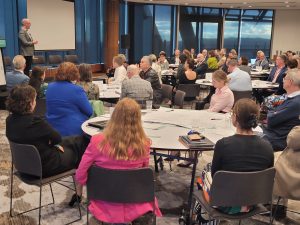Towards Trust in Government: Tackling Complex Problems Collectively
By Andrew Wills, Director IPAA Queensland
How do public servants, and the public sector as an institution, contribute towards building trust in government?
As Queensland contends with some of the more complex policy problems (for example, housing, homelessness, and youth justice), evidence continues to highlight the potential benefits of working hand-in-hand with community and non-government partners (Bryson, Crosby and Stone, 2015). The increasing interest in place-based approaches and cross-sector partnerships are examples.
Trust in government, and government leaders in particular, is a key challenge for democracies and public services across the world (see 2024 Edelman Trust Barometer). However, trust is also a key currency in the relationship between citizens and governments. For public servants, who are charged with responding to the needs of the community and serving the government of the day, this is a perennial and necessary challenge.
Trust between government and citizens is particularly vital to dealing with complex problems, yet trust also relies upon shared and open vulnerability (see our Foundations of Trust here). A key challenge here is that governments are often asking already vulnerable people to open themselves up to even greater feelings of compromise through the policy process, from design right through to implementation and evaluation.
In August 2024, IPAA Queensland’s CEO Forum tackled the issue of trust in government head-on by asking – how can complex problems be tackled collectively? 
More than 50 chief executives and deputies came together to dive into this topic, drawing on the wealth of practical experience in the room. Discussion was led by our panel including:
- Deidre Mulkerin, IPAA Queensland President & Director-General, Department of Child Safety, Seniors and Disability Services
- Dr Chris Sarra, CEO, Office of First Nations Engagement and Innovation, Department of the Premier and Cabinet
- Belinda Drew, Deputy Director-General, Women’s Safety, Victims and Community Support, Department of Justice and the Attorney-General
- Callam Porch, Head of Digital, Australian, Retirement Trust
The session was facilitated by our expert Dr Luke Craven, who posed three provocations to challenge thinking and set the tone for discussion. These were:
- Agreement is not alignment or coherence
- Good will is necessary but no sufficient for collaborative governance
- People value both adaptability and consistency, which are often not zero sum
Setting the foundations
Deidre Mulkerin kicked off a deeply thought-provoking discussion by positing that good will is merely a starting posture for developing meaningful relationships and in time, collaboration. For the Director-General, real transformative change is “grindingly hard” and requires a constant balancing act between working adaptively and consistently in order to manage a system where parts are operating at different speeds. She discussed nation-leading child safety reform undertaken in partnership with First Nations leaders and stakeholders in Queensland.
Reflecting back to earlier work which built upon his time as Principal of Cherbourg State School, a central part of the Aboriginal community located in Wakka Wakka tribal boundaries, near the border of Gubbi Gubbi territory, Dr Chris Sarra agreed. He developed an educational approach designed to improve outcomes for Aboriginal and Torres Strait Islander children. He talked about the process of taking the approach to educators in other communities. This required a deep commitment to showing-up, and not just at the outset – committing to building long-term relationships in a very tangible way. For Dr Sarra, these were formative learnings that he continues to draw on through his career in state-wide policy leadership.
Learning: Showing up with good will is merely a starting posture
Taking bigger steps
Belinda Drew came to public service after two decades in the social sector, which provided a useful lens to the conversation. Having substantial experience drawn from the other side of negotiations and partnerships with government, her advice to public servants was simple but potentially impactful: be open and explicit about government processes.
Working with partners with limited experience in the public sector may involve an investment in explaining what effective policy development will require. Public servants rely on the intelligence from community and stakeholders to help understand the challenges faced and the opportunities for policy design or improvement. Sending information in the other direction, with respect and humility, not only sends a signal to stakeholders about sincerity in the relationship, but helps to develop the wider understanding about how bureaucracy serves both democracy and the wider interests of community.
Head of Digital at Australian Retirement Trust, Callam Porch, supported the essential nature of transparency and adaptability. He reflected on the lessons learned in the financial services industry in response to national scrutiny and significant reforms and efforts to rebuild trust. He reflected on the organisation’s purposeful efforts to scale and adapt its ways of working – embracing continuous improvement and developing customer experience despite global and domestic challenges.
Learning: Communicate actively about government process
Revitalizing public ‘service’
Power became a core theme in the discussion.
Deidre Mulkerin reflected on the tension between holding accountability as a systems steward, and empowering others with humility. From her nearly forty years of experience in public service, a key learning is to “hold authority lightly to step forward and develop trust”. For IPAA Queensland’s President and public sector steward, ‘public service’ is more than a label or title, it is a reminder of whom we are in service to – the community. She argued that we must hold ourselves accountable in that service.
Is service a superpower? Belinda Drew argued it is. Building on Deidre’s powerful words and reflecting on her more recent career experience in the public sector, she said that showing up every day in service to the community is indeed a superpower. But she also emphasised that giving agency, empowering people to help themselves in times of vulnerability or crisis, is the next more sophisticated step in building trust in the partnership between government and citizens. Dr Sarra added the power of humanity. That public servants need not become detached from their humanity.
Learning: Lead with humility and humanity, but hold authority lightly
Discussion
As public servants we are also citizens. Most of us have experiences as a customer of government to draw on such as our interactions with public health services, state schools, or other frontline services like Transport and Main Roads. We can imagine what good or bad experiences look and feel like.
This forum pushes us to consider a different perspective on what it is to be a customer of government and how, as public servants, we shape trust through our interactions, approaches and general demeanor.
How we ‘show up’. How we hold our positional power. How we hold ourselves accountable.
In the context of complex problems in particular, this prompts us to ask different questions:
- Are we putting the needs of the community at the centre of policy design? How can this be done better?
- Are we doing our best to be in service to future generations, through the decisions we make now?
- Are we using our authority lightly? How are we being accountable to ourselves in service to community?
- What proactive steps can we take (with humanity and humility) to help stakeholders understand government process (and the role these play in democracy)?
To conclude, we draw on a call to action reflected back to room at the conclusion of the discussion with some of Queensland’s most senior public service leaders:
“If not us, who?”
We thank our major partner
and our 2024 event partner
ABOUT IPAA QUEENSLAND’S CEO FORUM
Our CEO Forum aims to support and develop stewardship capability across the Queensland public sector. The forum brings together senior leaders to challenge thinking, support knowledge development, and share practical wisdom. We are thankful to our initiative partner QSuper (part of Australian Retirement Trust) for making these forums possible.


